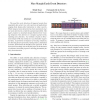Free Online Productivity Tools
i2Speak
i2Symbol
i2OCR
iTex2Img
iWeb2Print
iWeb2Shot
i2Type
iPdf2Split
iPdf2Merge
i2Bopomofo
i2Arabic
i2Style
i2Image
i2PDF
iLatex2Rtf
Sci2ools
134
click to vote
CVPR
2012
IEEE
2012
IEEE
Max-margin early event detectors
The need for early detection of temporal events from sequential data arises in a wide spectrum of applications ranging from human-robot interaction to video security. While temporal event detection has been extensively studied, early detection is a relatively unexplored problem. This paper proposes a maximum-margin framework for training temporal event detectors to recognize partial events, enabling early detection. Our method is based on Structured Output SVM, but extends it to accommodate sequential data. Experiments on datasets of varying complexity, for detecting facial expressions, hand gestures, and human activities, demonstrate the benefits of our approach. To the best of our knowledge, this is the first paper in the literature of computer vision that proposes a learning formulation for early event detection.
| Added | 28 Sep 2012 |
| Updated | 28 Sep 2012 |
| Type | Journal |
| Year | 2012 |
| Where | CVPR |
| Authors | Minh Hoai Nguyen, Fernando De la Torre |
Comments (0)

